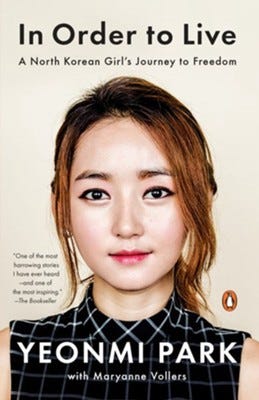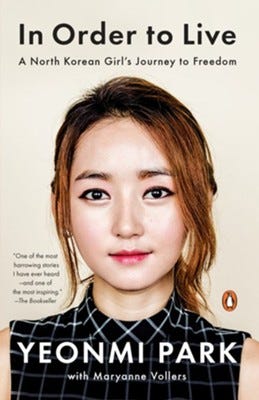Book Review: “In Order to Live: A North Korean Girl’s Journey to Freedom” by Yeonmi Park
What the quest for freedom looks like

The Apple TV screensaver shows a view of the Earth from space. As the image glides gracefully over Asia, the lights of China spread like spiderwebs into areas of darkness, but the light is never far away. Between China and South Korea is a black space, like a black hole amidst abundant luminescence. One might think that black space is the ocean, until you realize it is North Korea.
A country in the dark.
What is the book about
In this book, Yeonmi Park tells her story with courage and raw honesty. She describes what it was like growing up in North Korea, where the only education available promotes deification of the “Dear Leader,” denigration of freedom, and demonization of “American bastards.”
Imagine leaving your two children, who are under ten years old, to fend for themselves in the cold for a month. They have barely enough food to last them a week, no fuel to keep them warm, no lights to make them feel safe, and no way to communicate with their mother. They also do not know when their mother will return.
Imagine eating grasshoppers and cicadas as a gourmet meal.
Imagine being arrested and imprisoned for moving outside of your government-allotted geographic residence.
Imagine your loved one getting sick, taking them to the hospital, but not being able to get treatment because you don’t have enough money to bribe the state-controlled doctors.
Imagine being taught at a young age not to talk about anything out loud because even the birds and the mice have ears and anything can be interpreted as anti-government.
“…spies were everywhere, listening at the windows and watching in the school yard. We all belonged to inminban, or neighborhood “people’s units,” and we were ordered to inform on anyone who said the wrong thing. We lived in fear, and almost everyone — my mother included — had a personal experience that demonstrated the dangers of talking.”
Imagine being sent to a forced labor camp for the crime of starting a business to provide food for your children. While in that labor camp, you survive on the equivalent of one Western breakfast for a week all while enduring back-breaking work and beatings.
All for your own good of course.
What I got out of it
We’re spoiled and we take freedom for granted.
What happens to kids who are spoiled? They want more, and more, and more. Nothing satisfies them. They want things handed to them without having to work for it. When I listen to mainstream media (which is rare), they sound like whiney, spoiled children who expect mommy and daddy government to provide for every need. Let’s not go there, people, it’s dangerous.
“The most terrifying words in the English language are: I’m from the government and I’m here to help.” — Ronald Reagan
Like many others in this great nation, I grew up with two mantras that define the American experience.
1. You can do anything you set your mind to.
2. Work hard for what you want because no one is going to hand it to you.
Are there problems? Are there barriers to working toward what you want to achieve? Yes, but there are also opportunities to overcome them. It takes perseverance and hard work, character traits that seem to be less of a priority in our instant gratification culture. As my father-in-law says, it’s time for some character guidance.
In a country where freedom and opportunity exist in abundance, we whine about how evil and bad America is. People expect handouts and “free stuff” from the government to make their lives better. Ask North Koreans how “free stuff” and government control of their lives turned out.
No one and no country is perfect. Has the United States government made some bad decisions? Yes, but we’ve also learned from them and continue to learn from them. That’s the beauty of this country, we are free to fail and free to learn from experience.
The principles upon which this country was founded give us the ability to strive toward the ideals of liberty.
Yeonmi Park escaped from the North Korean nightmare at 13 years old. When I read about the level of courage and perseverance it took for her, her mother, and her sister to put themselves in even more danger just for the possibility that they could be free — it amazes me.
She was separated from her sister and left her father behind, with no way to communicate with him or anyone else in their family. When she got to China, she had to learn basic hygiene like how to use a toothbrush, and a whole new language. She endured the slavery of human trafficking and kidnapping there, again, separated from her family. She traveled across a freezing Gobi desert with strangers and no guarantee of freedom at the Mongolian border.
She had no concept of freedom, love, goals, none of it, but she knew she would die if she stayed in North Korea. They didn’t really understand what that freedom would be like or what kind of adjustment it would be, but they did it. The challenges they faced adjusting to a free life in South Korea is just as profound as their escape.
Her story not only reminds me how much we take freedom for granted, but also how much work there is to do in the world.
Is it worth your time to read and why
I invite all those who feel oppressed to read about real oppression.
I invite those who think America is bad and racist, to read about what it’s like to live in a real bad country.
I invite those who keep pushing for bigger government and more government handouts to read about what happens when government controls the lives of its citizens.
When I read stories like Yeonmi Park’s, Masaji Ishikawa’s, and Hyeonseo Lee and then listen to left-wing millionaires and academics whine about the oppression they’ve experienced, I want to yell and cry at the same time.
It sickens me that we know what is happening in North Korea as well as in China, yet do nothing. We hear the stories of people who finally escape, yet our government operates as if it is not happening.
As much as I am thankful for the policies President Trump put in place during his presidency, I would love to have a serious conversation with him about “getting along with Kim Jong Un.”
I suppose he might say that establishing a relationship is the first step toward negotiating change and as a therapist, I’m familiar with the stages of change. From that perspective, he would be right and maybe he didn’t have time to engage in change talk with the North Korean dictator.
But now our government is more worried about diversity, equity, and inclusion, the illusory climate change demon, and spending a gazillion dollars to give Americans more free stuff that will move us closer to enslavement.
When I hear Yeonmi Park in interviews describe classes at Columbia University as reminiscent of education in North Korea, I am frightened. She would know.
Freedom is fragile.
Give government too much power and that power becomes absolute. Our government is sliding down that slippery slope now and it has to stop. If it doesn’t, I fear the United States will join North Korea as black spots on Apple TV’s screensaver.
Books mentioned in this review:
“In Order to Live: A North Korean Girl’s Journey to Freedom” by Yeonmi Park
“A River in Darkness: One Man’s Escape from North Korea” by Masaji Ishikawa
“The Girl with Seven Names: A North Korean Defector’s Story” by Hyeonseo Lee
For more Book Reviews for Real People, follow Scriptorium. To submit a book for review, email scriptorium@reviveshine.com. For beta-reading services, go to www.reviveshine.com.


